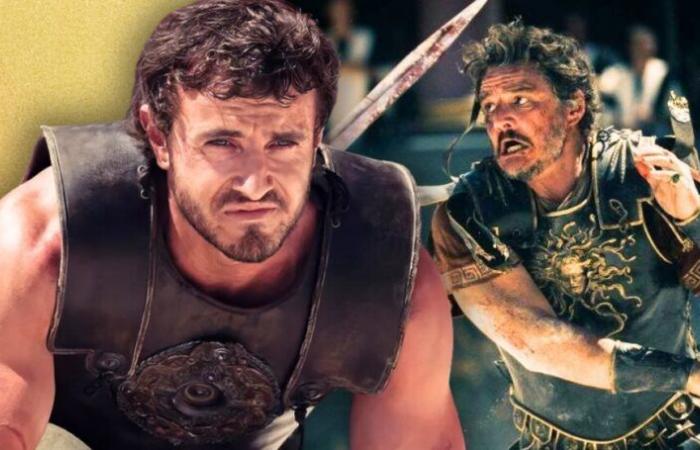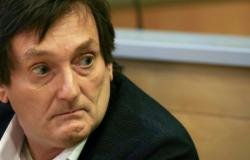Gladiatroce ?
“All these moments will be lost forever in time, like tears in rain.” The most cult replica of Blade Runner (yes we know, it's an improvisation by Rutger Hauer) continues to encapsulate all of Ridley Scott's cinema. In the space of one moment, one connection, everything can collapse. The bulimia of the Scottian characters, their thirst for power, can be brutally stopped in its tracks, just like the memory of their time on Earth.
Except that this bulimia is also that of its author, whose busy advertising style (multiple layers of shots, dynamic camera movements, increasingly sensitive editing over the years, etc.) seems incapable of accepting its own purpose. Not content with reinvesting the cinematographic heritage of the great masters (Cecil B. DeMille on ExodusAkira Kurosawa and his Rashomon effect on The Last Duel), Scott can't help but return to his own cinemato augment it with dispensable apocryphal gospels, even if it means disappointing.
Gladiator 2 doesn't even try to hide its deep emptinessrecounting how Maximus and Lucilla's kid, Lucius (Paul Mescal, straight off the indie circuit to become a blockbuster wild beast), fled Rome only to return as a slave, when the empire comes to take the African city which took him in. All of this is deliberately artificial, and does not avoid the pitfalls of legacyquel, while the gladiator son follows in his father's footsteps and reappropriates his attributes (armor, sword).
Nevertheless, this assumed program is at the heart of Scott's approach, fascinated by the notion of inevitable return. Maximus may have killed Commodus, and proven in the process that a single man could change his world and the injustices of his society, his legacy is already nothing more than a memory quickly swept away by the emperors who succeeded. We come back to tears in the rain of Blade Runnerbut also to this refusal of the final point which has run through Sir Ridley's cinema for quite a few years. There is this fear of the void, of the abyss and its inevitabilityfulfilled by this uninterrupted series of filming and images. We must nourish the empire to avoid its stagnation and collapse.
Bourg the arena
Therein lies the irony Gladiator 2. While General Marcus Acacius (Pedro Pascal) is tired of killing for the glory of a Rome on the edge of the abyss, the vain and gratuitous violence of the games continues to impose itself, and with it a sense of spectacle that connects more than never the filmmaker to the buffoonery of the emperors Geta and Caracalla (Joseph Quinn and Fred Hechinger, very in tune with the grandiloquence of the film in their constant histrionics).
Far from its philosophy cafes for high school students (Alien Covenant), the author seems to assume here the true ambition of this late comeback: make it bigger and crazier than the first Gladiatorin a pure technician's delirium supported by the latest technologies. It's not a bad word to see Scott as a gifted craftsman, a camera junkie who just wants to impress. Ultimately, wouldn't the adored author be at his best when he admits to staging this spectacle society that he claims to criticize?
It is through this observation that Gladiator 2 blows hot and cold. On the one hand, the director makes his most entertaining film in a long timeespecially when he has fun with a big rhino, voracious monkeys or even a naval battle in the middle of the Colosseum. On the other hand, this desire for epic, ever-expanding wide shots and scenes filled with CGI make the final result ever colder and more disembodied.

Denzel, man on fire
At the same time, isn’t that what the feature film is about? With his own nihilism, Scott deals with this devitalizationof the planned end of the Roman Empire, of these dehumanized slaves, and of the political shenanigans which go beyond individuals. Gladiator 2 loses the romantic side of the first film, which rewrote the story of Spartacus in its own way, to turn to the side of Game of Thrones. The characters all oppose each other in their personal objectives, before realizing that they are overtaken by a system that is rotten from the inside.
It’s a shame that the whole thing, launched on the same rails as the first episode, never manages to free itself from it. despite his most beautiful character: Macrinus. A former slave who became a selector of gladiators, he reflects as much the model of Roman success as his hypocrisy, which he intends to denounce by gradually taking power.

In a nicely anachronistic energy, Denzel Washington mixes the expected mannerisms of the period film with the gangster side of his role in Training Day. Beyond his obvious amusement, which steals the show in every sequenceit best reflects the eternal beginning sought by Scott, this bubbling self-destructive power, which has not changed much over the centuries.
If the “dream of Rome” is only an illusion, Gladiator 2 more or less assumes to dance on his corpse. Where the original had given its letters of nobility to the neo-peplum and its digital extravagances (300, Troy, Alexandre…), this sequel is aware that it is only an anomaly, a studio commission that has remained in the drawers for a long time. We can see Scott's cynicism, or his fascinating misanthropy, dedicated to once again filming the end of a civilization… or his own, again and again postponed.







